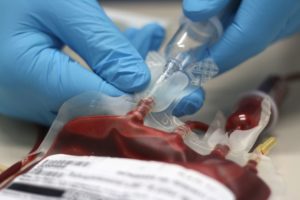Seeing Red over Continued Blood Donation Discrimination

In response to the horror of the mass shooting in Las Vegas last week, many people who wanted to offer more than “thoughts and prayers” volunteered to donate blood. Local blood banks and hospitals have also requested donations in the wake of the recent devastation brought about by Hurricanes Harvey, Irma, and Maria. When so many mass crises come at the same time, blood supplies can run dangerously low and blood donors are sorely needed.
Many people don’t realize, however, that among the groups of people who are not eligible to donate are gay and bisexual men, at least if they have had sex with another man in the last twelve months. So, if you are a gay or bisexual man and are sexually active—even if you scrupulously practice safe sex or only have protected sex in the context of a monogamous relationship including marriage—you are barred from volunteering your blood even when supplies are critically needed.
“Men who have had sex with men” (MSM, in the parlance of the Food and Drug Administration, the government agency charged with regulating the blood supply in the United States) were completely barred from donating blood in 1985 because of concerns raised during the AIDS epidemic. The policy remained in place until 2015. “The government’s unfounded policy is hurtful to the people being turned away solely based on sexual orientation and the millions of others who will be in need of a lifesaving blood donation,” activist Jordan Moll-Vigrass said at the time. “Eligibility should be based on risk-based science rather than on outdated, fear-based speculation.”
After pressure from advocacy groups, the FDA changed the rules in 2015 to allow gay men to donate so long as they had abstained from sex for at least twelve months prior to the date of donation. The twelve-month deferral applies to transgender men who have sex with men, but does not apply to transgender women who have sex with men. (Lesbians are not barred from donating.)
Obviously, this partial ban shuts out a large number of Americans from contributing, since many do not choose to abstain from sex for a year.
After the mass shooting at the gay nightclub Pulse in Orlando in 2016, LGBTQ activists and a group of Democratic lawmakers lobbied for the FDA to lift the twelve-month deferral. Rep. Jared Polis (D-CO), co-chair of the LGBT Caucus at the time, told the Huffington Post: “The fact that loved ones, and friends, and spouses of victims were unable to donate blood showed the moral bankruptcy of the ban.” He urged that “behavior-based criteria” replace the blanket deferral. “It’s ridiculous that a straight person can have unprotected sex with multiple partners and donate, but a monogamous gay or bisexual man cannot,” Polis remarked, concluding that the ban was “rooted in bigoted politics.”
Again, in the wake of Las Vegas and hurricane destruction, people have slammed the policy. Celebrities, including singer Lance Bass and actor Jeffery Self, have decried on Twitter their inability to give blood as gay men. The FDA has not yet changed the policy.
Since all donated blood is now tested for HIV, along with hepatitis B and C, syphilis, and other infectious diseases before being released into the supply, many believe that the ban is scientifically outdated and is based on ugly stereotypes.
There is always a need for blood donations. And currently there is a critical shortage of blood across many parts of the nation—some cities, according to ABC News, recently cancelled elective surgeries as a result. In 2014, a report from Williams Institute UCLA School of Law found that lifting the ban on MSM blood donations would increase donations by 615,300 pints a year.
In the early years of the AIDS epidemic there were no reliable tests for HIV. At that point the ban perhaps made some sense—although even then it would have made more sense to single out risky behavior rather than an entire group of people because of their sexual orientation. Now, there are reliable tests, and all donated blood is tested to make sure it’s safe. In view of these facts and the critical shortages of blood that occur periodically, isn’t it just common sense to require that those who want to donate affirm that they have practiced safe sex—rather than ban a large group of people from eligibility, just because they have sex with the people to whom they are attracted?
